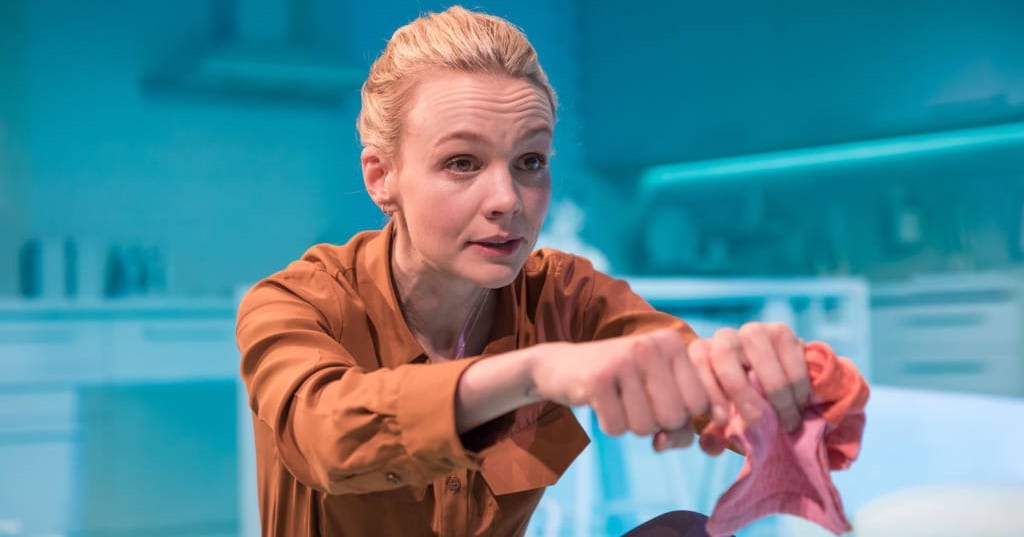I could describe Carey Mulligan’s performance in Girls and Boys as enthralling, unstoppable, a tour de force. But that rhetoric misses the mark. Mulligan’s performance emanates soft power. The play features a ‘performer’, relaying with honesty and wit the story of her life-altering relationship with the man who becomes her husband. The lines bristle with bathetic comedy, as the playwright (Dennis Kelly), subverts the audience’s expectations to deliver the punchlines. As the play goes on, this subversion turns from comic to tragic. In The Guilty Feminist podcast, Deborah Frances-White explains that we often dress up traumatic experiences as funny, it’s a kind of coping mechanism. Yet the wolf -in-sheepskin’s clothing in this drama cannot be hidden for long. Eventually, the jokes fall away as the character’s agony emerges. It is too great a spectre to hide. This play runs a risk of ending in abject tragedy, however, Kelly scripts hope, which Mulligan enacts. The pale blue sets and stark blackouts between scenes emphasise Mulligan, the centripetal force rippling out from the stage into the audience.
This play makes sense for Mulligan, it’s feminist (although not overtly) and offers interesting critiques of Western Society. Although there’s nothing preachy about it, Mulligan presents her character as sharing her opinions, contextualising her life in the 21st century. This is not only the story of an individual but one of the moments of commonality, where we all relate, whether it’s admitting that Paris is a bit underwhelming or reminiscing about a passionate love. According to Elle ‘Mulligan loathes the idea of strong female characters’ as it is undoubtedly a simplification. As if one can separate women into the ‘strong’ (cold, bossy, bitchy, masculine) and ‘weak’ (hysterical, submissive, ingenue- like and feminine). And Mulligan excels in presenting her character with nuance and dignity, revealing a strength in vulnerability.
She captivates, rather than dominates, which is even more affecting. In fact, describing her acting as a ‘performance’ is reductive. It is more transcendent than the word allows, she is the play and not simply because she’s the only cast member. Theatre is by nature a revealing art form, especially today with the contemporary emphasis on naturalism and unlike film, there is nowhere for a performer to hide. This vulnerability is doubly true of plays with small casts, more so of plays with a single actor. So, the actor has no choice but to completely immerse the audience in the story they are telling. Or the entire endeavour falls flat.
Mulligan rises above these stakes, seeping through them by literally characterising Kelly’s script, with the woman that she portrays. She pulls the play from the realms of the page into our reality. There is no fourth wall, so the actor cannot even rely on that for a semblance of artistic power, we all share in it and Mulligan revels in this. She portrays her character with a strength and unflinching capacity for love. She is not simply ‘a victim’, ‘a survivor’ or ‘a fighter’. As with many aspects of this production, straightforward categorisation is defied. It is brilliant, complex and captures a certain zeitgeist. It will be hard for any other actor to play this role, it will always be Mulligan’s.

